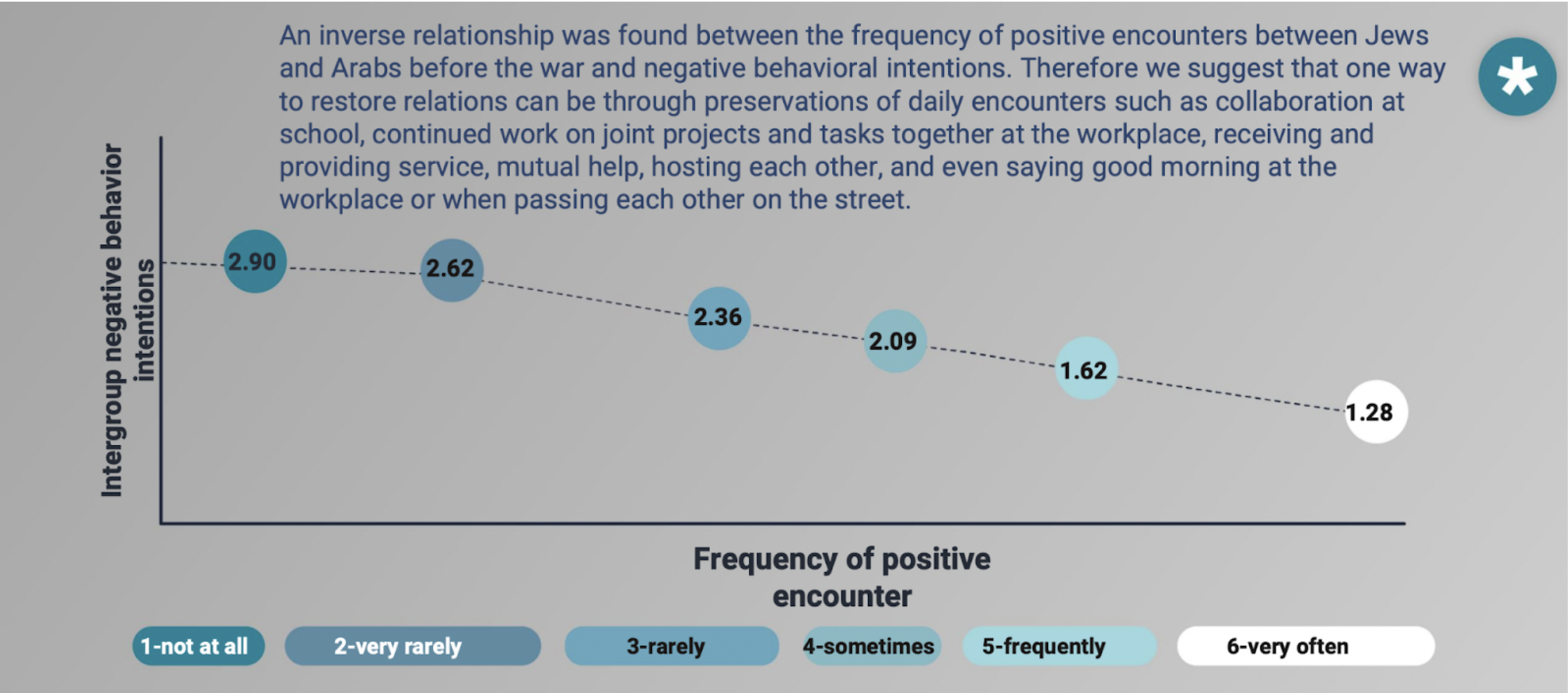Shared Society Explores Relations & the Benefits of Encounters
Three ALLMEP members recently conducted studies on the experiences and feelings of Arab and Jewish Israelis since October 7, with the aim of understanding how the war has impacted relations between communities within Israel, and the implications for future peacebuilding efforts. Givat Haviva and aChord explored the feelings and beliefs of Jewish and Arab Israelis, while Tsofen focused on the workplace experiences of Arab Israeli tech workers.
Rise in mistrust, anger, and hatred
The findings from all three studies highlight a significant rise in tension within Jewish and Arab communities. Jewish Israelis are reporting increased levels of mistrust, anger, and hatred towards Arabs (aChord, Givat Haviva). While there has been an increase of empathy exercised by Arabs towards Jews, over 60% of Arab respondents admitted to feeling threatened as a minority in a predominantly Jewish country (aChord). Arab tech workers confirm this trend: since the beginning of the war, the percentage of respondents reporting strained relations at work has increased fourfold, rising from 3% to 16%, and more than a quarter of them noted a deterioration in their interactions with Jewish colleagues (Tsofen).
Despite the absence of widespread physical clashes between Arab and Jewish communities, these high levels of mistrust and tension have surpassed those observed after the Second Intifada (Givat Haviva), prompting over 30% of individuals from both communities to actively avoid each other in public spaces (aChord, Givat Haviva).
How can relations between Jews and Arabs be restored and the intention of negative behavior reduced?
However, importantly, the studies also reveal that having more interactions with people from the ‘other’ group before the outbreak of the war made individuals less likely to experience negative feelings and behaviors, emphasizing the essential role of intergroup interactions in mitigating violence and fostering understanding.

(aChord)
The significance of people-to-people encounters is echoed by both Arab and Jewish respondents. While both stated that shared political environments are seen as weakening relationships between one another, more personal interactions in the workplace, in higher education, or at social gatherings enhance relationships between the two groups (Givat Haviva). Peacebuilding is thus widely perceived as most effective when approached at the grassroots, people-to-people level.
Despite the proven positive impact of intergroup encounters on shared society living, the current crisis has led to the avoidance of such vital interactions. To palliate this phenomenon, Givat Haviva stresses the importance of “engineering encounters between Jews and Arabs” through shared workplaces and universities to ensure the promotion of daily, meaningful encounters (Givat Haviva). Similarly, aChord points “to the importance of maintaining daily encounters between the members of the two groups” and suggests that “these encounters can exist as part of school life, continued work on joint projects and tasks together at the workplace, receiving and providing service, mutual help, hosting each other, and even saying good morning at the workplace or when passing each other on the street. All of these have the power to reduce concerns about the other group and the perception of the threat.”
This is precisely what our members are focusing on during this extremely challenging time. Givat Haviva, for example, has taken proactive measures to preserve interactions and safeguard its teacher exchange program, ensuring the continued exchange of Jewish and Arab educators between communities, even in the aftermath of the conflict. Impressively, the program has witnessed minimal disruption, with only a 3% withdrawal rate (Givat Haviva). Similarly acknowledging the need to promote and protect interpersonal connections, Tsofen has recently launched an advocacy campaign underscoring collaboration among Jewish and Arab hi-tech workers. With the slogan “Working together – now is the time to project the voice of partnership“, the campaign strives to strengthen relationships and convey a message of hope and perseverance. Tsofen has already garnered support from leading hi-tech companies, including Intuit, Hailo, and Sanofi, further supporting intergroup encounters.
Looking to the future, it is crucial to keep encouraging social interactions to reduce fear, mistrust, and anger, while also promoting empathy and understanding for each other. Prioritizing these positive connections is key to building a strong foundation for lasting peace.
